The Vital Connection Between FMCG and HORECA in the UAE
- July 20, 2024
- FMCG HORECA BUSINESS

In the UAE, the Fast-Moving Consumer Goods (FMCG) sector plays a crucial role in supporting the vibrant HORECA (Hotels, Restaurants, and Cafés) industry. This interdependence is foundational, with FMCG products being essential for the daily operations of HORECA establishments. As the UAE continues to grow as a global tourism and business hub, understanding this relationship is key to capitalizing on market opportunities.
Key Drivers of FMCG Demand in HORECA
- Tourism Growth: The UAE's appeal as a tourist destination means a constant influx of visitors who demand high-quality hospitality services. Hotels and restaurants rely on a steady supply of top-tier FMCG products to maintain their standards and satisfy guests.
- Diverse Consumer Preferences: The UAE’s multicultural population requires a wide variety of FMCG products to cater to different tastes and dietary needs. This diversity pushes HORECA businesses to source a broad range of products, from international cuisines to specialized dietary items.
- Health and Sustainability Trends: There is a rising demand for organic, natural, and sustainably sourced products. HORECA establishments are increasingly integrating these into their offerings, influencing FMCG suppliers to adapt their product lines to meet these expectations.
Emerging Trends
- Sustainability: Eco-friendly products and sustainable practices are becoming more prevalent. HORECA businesses prefer FMCG products with minimal environmental impact, such as biodegradable packaging and locally sourced ingredients.
- Technological Integration: Automation and AI are transforming both sectors. From smart kitchens to AI-driven customer service, technology is enhancing efficiency and customer experiences.
- Premiumization: There is a shift towards premium products, with consumers willing to pay more for superior quality and unique experiences. This trend drives HORECA businesses to seek out high-end FMCG products.
Challenges and Opportunities
Challenges:
- Supply Chain Disruptions: Global events can impact the supply chain, affecting the availability of FMCG products.
- Regulatory Compliance: Strict regulations on food safety and labeling require careful navigation by both FMCG suppliers and HORECA businesses.
Opportunities:
- Collaborative Innovation: Joint efforts in product development and sustainability initiatives can lead to innovative solutions that benefit both sectors.
- Digital Transformation: Embracing digital tools for inventory management and customer engagement can streamline operations and improve service delivery.



